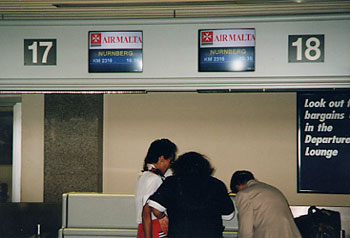Air Malta Flight 180 At the time of the Pan Am 103 bombing, Abdelbaset Megrahi was Station Manager for Libya Arab Airlines at Malta's Luqa airport. The other defendant, Fhimah, had been head of security for the Libyan airline until September of 1988, when he left his airport job to begin launching a travel-related business of his own. The conspiracy charge against the pair says all of their jobs were covers for their real work with the JSO, the Libyan Intelligence Service. The indictment says that on the morning of the 21 December, 1988, the two men placed aboard Air Malta Flight 180, from Malta to Frankfurt, a brown Samsonite suitcase containing the bomb that ultimately blew up Pan Am 103. The prosecution will argue that the deadly suitcase was then transferred as unaccompanied baggage, first to Pan Am Flight 103A at Frankfurt, then to Flight 103 at London, before blowing up over Lockerbie. Some terrorism experts argue that that scenario is implausible on its face. One such skeptic is Noel Koch, who headed the US Defense Department's anti-terrorism efforts from 1981 to 1986. Sophisticated Middle East terrorists who wanted to blow up a plane over the North Atlantic, Koch insists, would not plant their bomb nearly a thousand miles away and rely on two successful luggage transfers by airline workers. "I can tell you this much that I know about terrorism: it's simple," Koch says. "You don't complicate life. Life's complicated enough as it is. If you've got a target you want to get as close as you can to it and you don't go through a series of permutations that provide opportunities for failure, that provide opportunities for discovery. It doesn't work that way." A former British Intelligence official disagrees. "You could say there is good reason for putting up a bomb suitcase on three planes, because it makes it that much more difficult to trace," says David Shayler, who headed the Libya Desk for MI5 in the mid-1990s.
At the time of the indictment, a US State Department fact sheet pointed to a baggage list found at the Frankfurt airport in 1989, which appeared to show that a suitcase unloaded from the Air Malta flight was in the baggage system at the time workers were loading baggage on Pan Am 103A. The State Department report said the records "show that an unaccompanied bag was routed from Air Malta Flight 180 ... to Frankfurt, where it was loaded onto the Pan Am 103 feeder flight to London." But behind the scenes, that assertion was disputed by investigators themselves. An internal FBI memo from October of 1989 said it's "misleading" to conclude from the Frankfurt airport records that any bag, let alone one carrying a bomb, was transferred from the Air Malta flight to the Pan Am plane. It said there's "no concrete indication" of that. In fact, Air Malta and Maltese law enforcement officials say Air Malta Flight 180 did not carry any unaccompanied luggage on the day that Pan Am 103 blew up. Maltese officials insist that all 55 bags checked onto the Flight 180 that day were claimed by passengers - and that Scottish and American investigators found as much in their interviews with passengers. The bags "tallied completely," says Maltese Police Commissioner George Grech. Malta's Minister of Home Affairs, Tonio Borg, makes a more sweeping claim. "We have no proof that these two Libyan suspects were involved in anything illegal in Malta regarding this case, particularly the placing of this bomb on Air Malta Flight ... 180," Borg says. A German court agreed. A German investigating magistrate produced a report saying he could find no evidence of a bag switch from the Air Malta plane to Pan Am 103A at Frankfurt on December 21, 1988. In 1992 the German government suspended prosecution of the Libyan defendants, citing a lack of evidence. |

